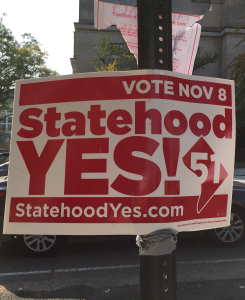
Voters in D.C. voted overwhelmingly in favor of delivering a petition to Congress on inducting Washingon, D.C. as the 51st state.
Over 80 percent of the Washington, D.C. electorate voted in favor of D.C. statehood Nov. 8, advancing a measure to petition Congress to induct the District of Columbia as the 51st state.
The four-part referendum, which was proposed by Mayor Muriel Bowser (D) in April and unanimously approved by the D.C. Council in July, includes measures to admit the District into the union under the name New Columbia and call for an elected representative form of government. Additionally, the voters approved a Constitution and state boundaries for the District.
Under the proposal, the state of New Columbia would be converted into a residential state with small cutouts for government buildings and monuments remaining federal district land. The measure would further replace the D.C. mayor with a governor and the D.C. Council with a 21-member legislative assembly.
At the federal level, the new state would have one voting representative in the House of Representatives and two senators. The District of Columbia currently has one nonvoting representative in the House of Representatives, Eleanor Holmes Norton (D). Holmes Norton is currently only allowed to serve on committees and talk on the House floor.
D.C. also currently has two nonvoting shadow senators and one nonvoting shadow representative in Congress. These elected delegates’ main roles are to lobby Congress to give District residents full representation.
Bowser said she hopes to deliver a petition to President-elect Donald Trump and Congressional leaders before Trump’s inauguration in January. Congress has the power to approve or reject the measure.
One of D.C.’s shadow senators, Paul Strauss (D), who was elected by D.C. residents for a two-year term but has no vote in Congress due to D.C.’s lack of statehood, said he was heartened by the positive consensus of District residents. However, Strauss said the statehood movement faces an uphill battle with the Republican majorities in both chambers of Congress as D.C. is predominantly Democratic, with the D.C. Board of Elections reporting 76 percent of the District’s voters are registered Democrats as of Oct. 31.
“We intend to continue to educate the American people about D.C.’s need and desire for statehood and we’re pleased to have the new tools given to us by the referendum,” Strauss said. “But in the 115th Congress, let’s be frank, we are back on defense and so most of our time will be spent defending the limited existent sovereignty that we have, as opposed to moving the ball forward.”
D.C.’s shadow Representative, Franklin Garcia (D), attributed the potential Republican reluctance to the measure to the prospect of two new Democratic senators and a Democratic member of the House.
“People’s rights should not be a partisan issue, but unfortunately it is,” Garcia said. “The fact that both houses are now under Republican control makes it very, very challenging.”
Congress previously defeated an attempt for D.C. statehood in 1993 after a House vote rejected a proposal 277-153 votes. Earlier attempts, including a 1980 call for a constitutional convention and a 1982 ratification of a constitution by D.C. voters, either stalled or expired.
Garcia said the drive for statehood has been an issue of disenfranchisement in D.C. and needs to be addressed.
“The referendum is a piece of work that goes back to ’81 at a minimum,” Garcia said. “Prior to that, people were already talking about autonomy. People have been complaining for centuries, if you will.”
Chris Murphy, Georgetown’s vice president for government relations and community engagement, acknowledged the value of the referendum as an opportunity for reflection on options for advocates of D.C. statehood. He also said it highlighted the need for Georgetown students to become active in the movement.
“It’s a moment for D.C. statehood advocates to step back, regroup and explore the options for going forward,” Murphy wrote in an email to The Hoya. “For starters, they need to find ways to educate people about this ongoing injustice that denies 670,000 Americans a basic right of democracy every day. And Georgetown students — many of whom come from all around the country and the world — can be an important part of this effort.”
Georgetown University Student Association Federal and D.C. Relations Committee Secretary of D.C. Statehood Cheryl Liu (SFS ’19), who is also a member of GU Students for D.C. Statehood, a student organization that helped campaign for the referendum, cited a lack of nationwide concern for the statehood effort as major problem facing the issue. If constituents from other states called on their representatives in Congress to vote for the matter, Liu said she believes it would gain more traction, even among Republicans.
“I think it’s not as universal an issue as it should be in that if you don’t live in D.C., you aren’t affected by it,” Liu said. “They’re not pushing their congressmen or senators to move on this issue. If our representatives don’t feel pressure, then they’re probably not going to have this at the top of their priority list.”




















